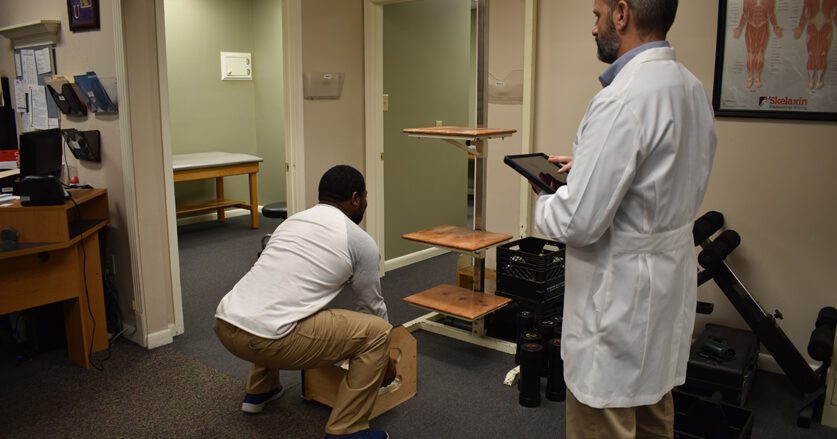Call Us Now1-800-414-2174


By Richard Bunch, PT, PhD, CBES and Trevor Bardarson, PT, OCS, CBES
The Americans with Disabilities Act (ADA) permits physical ability tests (PATs) for job applicants if they are applied on a post-offer basis and uniformly for all individuals within the same job category tested. A post-offer PAT is a medical exam to determine whether a job applicant or current employee is physically able to safely perform the essential functions of a job with or without accommodations. To be legal, the test must be job-related and consistent with business necessity. Employers can conduct or require medical examinations separate from or as part of a PAT only after a conditional offer of hire is made. Any test that is conducted by a medical professional and/or uses medical testing and/or monitoring is considered a medical test.
To require a PAT for incumbent employees, an employer must have a reasonable belief based on objective evidence that an employee’s ability to perform essential job functions will be impaired by a medical condition or the employee will pose a direct threat of harm to self or others due to a medical condition. This type of PAT can be referred to as a “for cause” PAT and cannot be based on assumptions or stereotypes. The standard for objective evidence can be met when an employer:
One example of when an employer might require a PAT for cause, according to Equal Employment Opportunity Commission (EEOC) guidance, is if a crane operator exhibits certain behaviors such as feeling light-headed, out of breath and has to sit down abruptly. In this example, the employer can reasonably believe, based on objective evidence, that the crane operator may pose a direct threat of harm to self and even others while working on the construction site. A PAT can be ordered “for cause” to determine whether the worker is fit to perform the job or will require an accommodation (e.g., job reassignment).
A PAT should be tailored for the specific job in question and should not be an overly broad medical exam. For legal compliance, a validated functional job description (FJD), or other formal document that memorializes validated job demands, should be available on demand to substantiate that functional tests (e.g., lift/carry tests and ladder climbing) used in the PAT correlate to the actual physical demands required to perform essential job functions. The correlation of the test to the job should be validated using statistical methods involving content, criterion-based, or construct validity as per EEOC’s Uniform Guidelines on Employee Selection Procedures (“Uniform Guidelines”). FJDs are not only essential for providing the legal foundation of PATs and other employment tests, but they are also very useful to assist doctors in making return to work decisions following medical treatment and ADA or FMLA leave.
The ADA prohibits mandatory PATs as a condition of return to work following ADA or FMLA Leave. However, a medical PAT can be ordered for cause after an individual has returned to work and the employer has a reasonable belief that the ability to perform essential job functions will be impaired or that the worker will pose a direct threat of harm to self or others.
If an employee has been out on leave for the employee’s own serious health condition under the Family and Medical Leave Act (FMLA), that law lets an employer require a fitness-for-duty certification from the employee’s doctor. The exam would be a condition of reinstatement, so long as the employer has a uniformly applied policy or practice that requires all similarly situated employees who take leave for such conditions to submit such certification and, if the employer appropriately notifies the employee ahead of time that the certification must address the employee’s ability to perform the essential job functions and lists those functions. In such cases, the essential job functions, as for example are outlined in a FJD, can be provided to the employee’s doctor.
Interested in Creating or Improving Your Employee Physical Abilities Testing Program? |
| Since 1993, WorkSaver Employee Testing Systems LLC has been conducting new hire and return to work physical abilities testing nation-wide for numerous industry clients. WorkSaver can create a PAT program from the ground up that includes on-site ergonomic validation of essential job demands, creation of functional job descriptions, creation of policies and procedures for the employer, provision of accommodation review protocols, validation of testing protocols, and rolling out testing in geographical locations required by the employer.
Our testing process is fully integrated for both employers and testing sites (clinics) to cover online scheduling, test monitoring, and maintaining statistics of testing outcomes. WorkSaver is the only program of its kind that utilizes full time nurses and support staff to conduct real time monitoring of every assessment that is conducted by licensed physical and occupational therapists. WorkSaver physical abilities testing has been successfully tested legally to be fully EEOC compliant. If there are any questions about how to establish a fully EEOC-compliant physical abilities testing program (aka fitness for duty testing program), please feel free to visit our web site at www.worksaversystems.com, or call us at (800) 414-2174 or (985) 853-2214. |
WorkSaver Employee Testing Systems 478 Corporate Dr. Houma, LA 70360
![]()